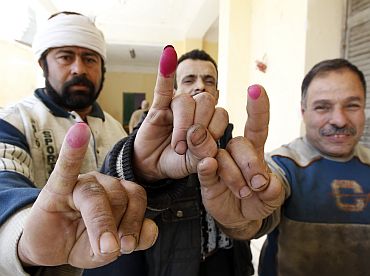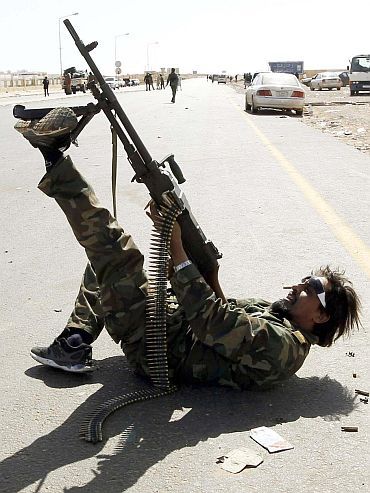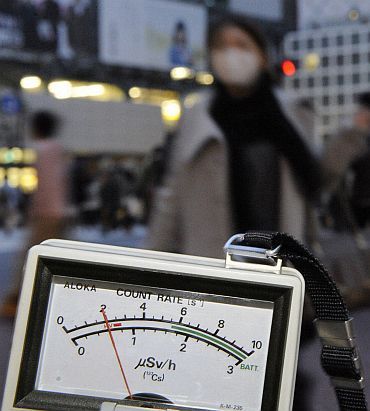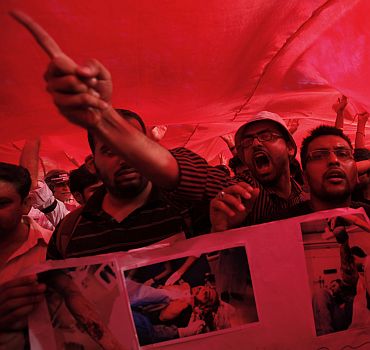Photographs: Amr Abdallah Dalsh/Reuters
Missed out on the major international news this week? Don't worry. We bring you a round-up of major stories this week.
Saturday, March 19
Cairo: Taking the first major step towards a transition to transparent democracy, Egyptians turn up in overwhelming numbers to vote on landmark constitutional amendments.
Cairo/New York: Troops loyal to Muammar Gaddafi push into the eastern rebel-stronghold of Benghazi as world leaders mulled military options against the embattled leader who defied a global demand for an immediate ceasefire.
...
Also See: News Digest: India this Week
News Digest: The World this Week
Image: Muslim fundamentalists protest against western intervention in LibyaPhotographs: Luke MacGregor/Reuters
Sunday, March 20
Tripoli/Cairo: Western forces unleash over 100 Tomahawk cruise missiles on military targets in Tripoli and along the Mediterranean coast and Libyan forces call for a new ceasefire, after a defiant Muammar Gaddafi had vowed to retaliate against western 'aggression' and the 'war on Islam'.
Cairo: Fresh from upturning the 30-year rule of Hosni Mubarak, Egyptians have voted overwhelmingly to endorse a package of constitutional amendments, paving the way for fresh parliamentary elections.
News Digest: The World this Week
Monday, March 21
Tripoli/Cairo: Western forces intensify strikes on Libyan defence targets flattening a command centre close to Muammar Gaddafi's private residence, as more nations joined the campaign in Libya and the Arab League declared its commitment to the UN-mandated action after initially voicing concerns over the bombardment.
Dubai: Ali Abdullah Saleh's 32-year-old iron fisted rule appeared to be tottering as three army generals, including his longtime confidant, joined the mass uprising and deployed tanks and armoured vehicles to protect protesters, while Yemen's top tribal leader also asked the President to step down.
News Digest: The World this Week
Tuesday, March 22
Damascus (Syria): Protests spread in southern Syria as hundreds of people march to demand reforms in a previously peaceful village.
Tripoli/Washington: Western forces pound several Libyan military targets across Tripoli as fighting rages in a number of cities between the rebels and forces loyal to Muammar Gaddafi and NATO allies tried to overcome differences over the role they should play in Libya.
News Digest: The World this Week
Wednesday, March 23
Daraa (Syria): Syrian police launch a relentless assault on a neighbourhood sheltering anti-government protesters, fatally shooting at least 15 in an operation that lasted nearly 24 hours.
Tokyo/Fukushima: High levels of radioactive iodine are detected in Tokyo's tap water prompting government to declare it unsafe for infants, as rising smoke from the crippled Fukushima nuclear plant forced another evacuation of Japanese workers battling to restore its cooling functions.
News Digest: The World this Week
Thursday, March 24
Tripoli/Washington: Despite air strikes by western warplanes for the sixth day, Libyan forces shows no signs of relenting, moving tanks and forces in the night hammering rebel stronghold Misurata and other towns, forcing people to flee.
Tokyo/Fukushima: Three workers are exposed to high radiation at Japan's troubled Fukushima nuclear plant, as authorities mulled plans to import bottled water amid a panicked rush to buy it after the tap water here was briefly declared unfit for infants due to contamination.
News Digest: The World this Week
Image: Protesters shout slogans while standing underneath Bahrain's national flag during a protest against Bahrain's King Hamad bin Isa Al-KhalifaPhotographs: Danish Siddiqui/Reuters
Friday, March 25
Manama: Bahrain's security forces fire tear gas at anti-government protesters in the Gulf kingdom after a prominent Shiite cleric vowed that their demands for the Sunni monarchy to loosen its grip on power will not be silenced by "brutal force."
Tokyo/Fukushima: Japan's nuclear crisis deepens further today, with authorities saying that a reactor vessel at the crippled Fukushima atomic plant may have damaged as some workers were exposed to radiation levels 10,000 times higher than normal, prompting Premier Naoto Kan to term the situation as "very grave".








article